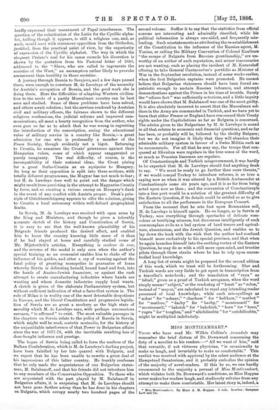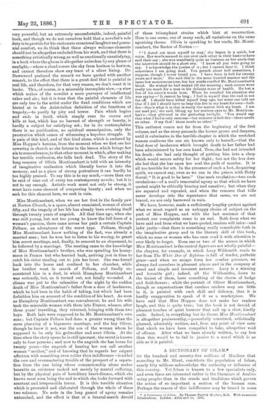MISS MONTIZAMBART.*
THOSE who have read Mr. Wilkie Collins's Armadale may remember the brief dictum of Dr. Downward concerning the duty of a novelist to his readers :—" All we want of him," said that versatile, if not virtuous physician, "is occasionally to make us laugh, and invariably to make us comfortable." This verdict was received with approval by the select audience at the Hampstead Sanatorium, and it probably embodies the opinion of the majority of novel-readers. If this be so, we can hardly recommend to the majority a perusal of Miss Mont izambart, which violates both Dr. Downward'e conditions, as Miss Hoppus never makes her readers laugh, and studiously refrains from any attempt to make them comfortable. Her latest story is, indeed, a
Miss Montizambart. By Mary A. M. Hoppas. 2 rob. London: Sampson Low and Co.
very powerful, but an extremely uncomfortable, indeed, painful book, and though we do not ourselves hold that a novelist's sole duty is to provide for his customers occasional laughter and peren- nial comfort, we do think that these always welcome elements should not be altogether excluded from his work, and that there is something artistically wrong, as well as emotionally unsatisfying, in a book where the gloom is altogether unbroken by any gleam of sunlight,—where a cloud covers the sky from horizon to horizon, and cannot therefore show any trace of a silver lining. Dr. Downward prefaced the remark we have quoted with another remark, to the effect that there is a great deal that is painful in real life, and therefore, for that very reason, we don't want it in books. This, of course, is a miserably incomplete view,—a view which makes of the novelist a mere purveyor of intellectual cakes and ale ; but it is true that the painful elements of life are only free to the artist under the fixed conditions which are hinted at in the Aristotelian definition of the functions of tragedy,—to purify by pity and terror. Pain which begins and ends in itself, which simply runs its course and kills at last, which has no harvest of strength or beauty, is hardly a subject for satisfying art ; for in its contemplation there is no purification, no spiritual emancipation, only the prostration which comes of witnessing a hopeless struggle. It is pain of this kind, and of this kind alone, which is endured by Miss Hoppus's heroine, from the moment when we first see her cowering in church as she listens to the lesson which brings her sin to remembrance, to that other moment in which, after making her terrible confession, she falls back dead. The story of the long remorse of Olivia Montizambart is told with an intensity of imaginative realisation which literally burns it into the memory, and as a piece of strong portraiture it can hardly be too highly praised. To say this is to say much,—more than can be said of nine out of every ten contemporary novels; but it is not to say enough. Artistic work must not only be strong, it must have some element of conquering beauty ; and when we seek for this element here, we seek in vain.
Miss Montizambart, when we see her first in the family pew at Norton Church, is a spare, almost emaciated, woman of about fifty, and the tragedy of her life has already been evolving itself through twenty years of anguish. All that time ago, when she was still young, but not too young to know the full force of a woman's passion, there came across her path a certain Captain Pelham, an adventurer of the worst type. Pelham, though Miss Montizambart knew nothing of the fact, was already a married man ; but he won her to listen to his wooing, to grant him secret meetings, and, finally, to consent to an elopement, to be followed by a marriage. The meeting came to the knowledge of Miss Montizambart's brother, who was spending his honey- moon in France but who hurried back, arriving just in time to catch his sister stealing out to join her lover. She was forced back into the house and confined to her chamber, while her brother went in search of Pelham, and finally en- countered him in a duel, in which Humphrey Montizambart was seriously, but, as it turned out, not fatally wounded. A climax was put to the calamities of the night by the sudden death of Miss Montizambart's father from a dose of laudanum, which he had been in the habit of taking, but which had been forbidden him on account of the condition of his heart. As soon as Humphrey Montizambart was convalescent, he and his wife took the miserable woman with them into France, whence, after three years' travelling, they returned, bringing with them two boys. Both lads were supposed to be Mr. Montizambart's own sons ; but Captain Pelham had done a greater wrong than the mere planning of a bigamous marriage, and the boy Oliver, though he knew it not, was the son of the woman whom he supposed to be only his godmother and aunt Olivia. At the time when the story opens he is still ignorant; the secret is known only to four persons ; and now to the anguish she has borne for twenty years—the anguish of hearing her son call another woman "mother," and of knowing that he regards her exigent affection with something even colder than indifference—is added the new and overmastering trouble of the prospect of a separa- tion from the one being whose companionship alone makes bearable an existence racked not merely by mental suffering, but by the physical pain of hereditary heart-disease, which she knows must soon bring the end to which she looks forward with constant and irrepressible terror. It is this terrible situation which is presented and elaborated through the whole of these two volumes. No note in the long gamut of agony remains untouched, and the effect is that of a funeral-march devoid of those triumphant strains which hint at resurrection.
Here is one scene, one of many such, all variations on the same agonising theme. Olivia is speaking to her uncle, Mr. Monti- zambart, the Rector of Norton :—
" 'I dared not trust myself to stay,' she began in a quick, low voice. Her words seemed to run over each other in their haste to have said their say ; she was manifestly quite as desirous as her uncle that the interview should be a short one. know all you were going to say. I acknowledge the justice of it ; but I cannot bear it. I think sometimes I am going mad. You preach about hell sometimes, I suppose, though I never heard you. I have been in hell for twenty years,and more.' She said this in the same hurried manner and the same low monotonous tone, but her words cot-died Mr. Montizambart's blood. He wished he had waited till the morning ; such scenes were really too much for a man in his delicate state of health. He lost a few of his niece's words here. When he recalled his attention she was saying—' It cannot be long ; I feel in myself that the end is not far off. I should have killed myself long ago, but some one told me that if I did I should have to bear this fire in my heart for ever—hell- fire—that's what it is that is really the matter with my heart. I am not mad yet,' she said, lifting up her restless eyes to Mr. Montizam- bart's—they glittered in the gathering twilight. You would say that what I feel is only remorse—but remorse is hell.fire—there needs no other. 0 my God ! there needs no other!"
This outburst comes not far from the beginning of the first volume, and as the story proceeds the horror grows and deepens, until it culminates in the terrible chapter in which the wretched woman confesses the one sin known only to herself,—that the fatal dose of laudanum which brought death to her father had been administered by her own hand. True, she had not intended his death ; she had only thought of putting him into a sleep which would secure safety for her flight; but not the less does she feel that she has upon her soul the guilt of murder. It is all too terrible for art. In the presence of such a lost, despairing spirit, we cannot say, even as we can in the prison with Hetty Sorrel, " It is good to be here." One such revelation—two such revelations—of a soul's remorseful agony as that which we have quoted might be ethically bracing and sanative ; but when they are repeated and repeated, and when the remorse that kills never develops into the repentance that saves, we are not braced, we are only harrowed in vain.
We have, however, made a sufficiently lengthy protest against what we must regard as an unhappy choice of subject on the part of Miss Hoppus, and with the last sentence of that protest our complaints come to an end. Both from what we have said and from what we have quoted, readers will infer—and infer justly—that there is something really remarkable both in the imaginative grasp and in the literary skill of this book,
which no man or woman who has once read it with attention is ever likely to forget. Even one or two of the scenes in which Miss Montizambart is the central figure are not wholly painful—
the chapter, for example, in which Lucy Wildsrnith reads to her from The White Doe of Byletone is full of tender, pathetic grace—and when we escape from her sombre presence, we always find ourselves in pleasant places and in the company of sweet and simple and innocent natures. Lucy is a winning and loveable girl ; indeed, all the Wildsmiths, down to the tiniest of them, have something of the charm of hedge and field-flowers; while the portrait of Oliver Montizambart, though so unpretentious that careless readers may see little in it, is painted with such skill and delicacy, that it is hardly exaggeration to speak of it as a masterpiece. We have said that Miss Hoppus does not make her readers laugh, and this is quite true ; but the book is not devoid of pleasant touches of quiet humour that call up a slow, kindly smile. Indeed, in everything but its theme Mies Montizambart is altogether praiseworthy,—powerfully conceived, artistically planned, admirably written, and, from any point of view save that which we have been compelled to take, altogether void of offence. After what we have already written, to say less than this would be to fail in justice to a novel which is as able as it is painful.



































 Previous page
Previous page